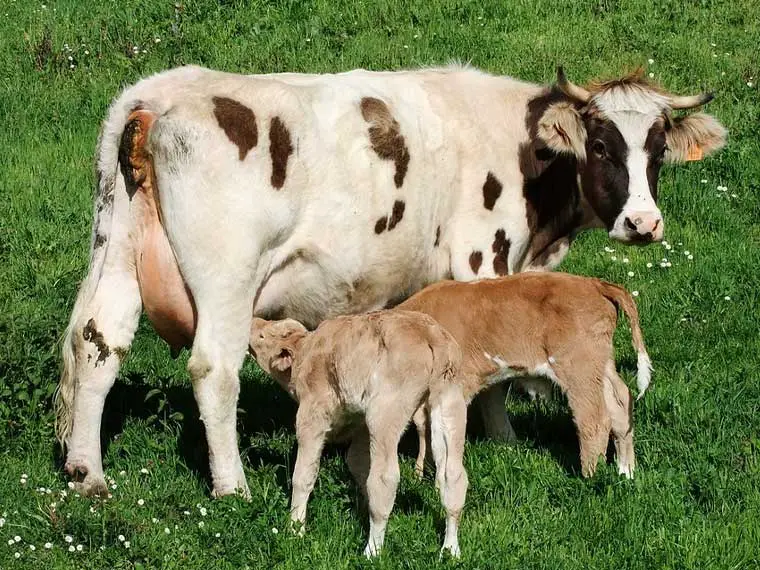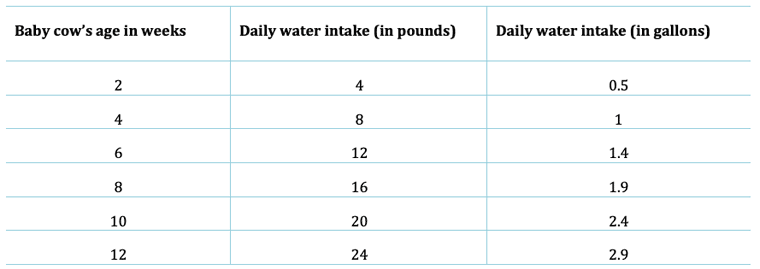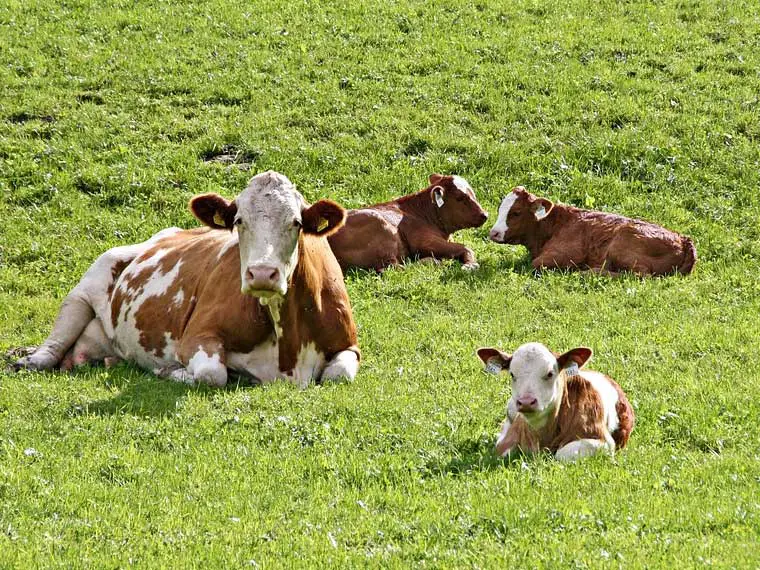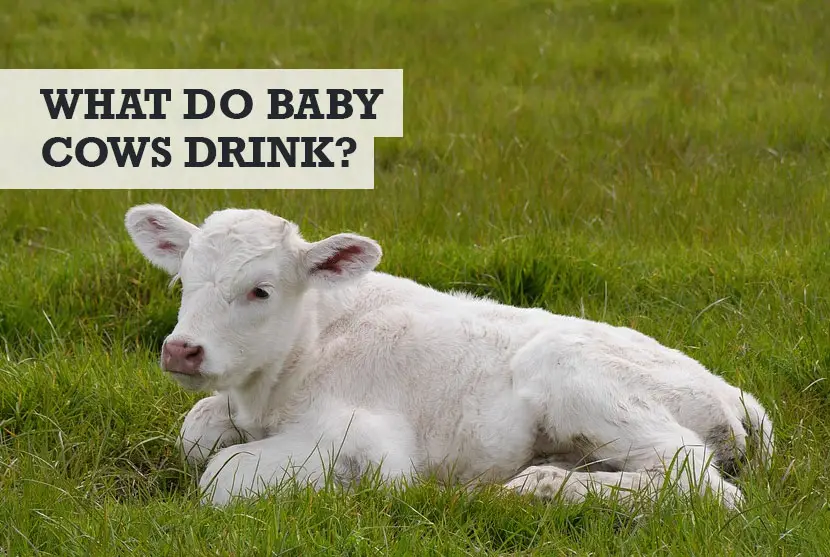Unlike grown cows, baby cows, also known as calves, depend more on liquids to survive. As soon as a calf is born, it’s up to the calf owner to get it off to a good start. Are you unsure of the must-drink liquids to give a baby cow? I’ve got you covered.
What do baby cows drink? Baby cows drink water, colostrum, fermented colostrum, transition milk, whole milk, and liquid feed made from milk replacer powders. Provide these drinks if you want a baby cow to be in its best health and mood.
They’re all beneficial to a calf’s growth from newborn and up, as you’ll see below. I will explain whether baby cows drink water or milk, or even both. And all drinks in between that are important for a baby cow’s heath and development.
How much of each drink should a young cow take? You’ll find the answers to this and more in this piece.
What do newborn cows drink?
Newborn cows drink water, fresh colostrum, fermented colostrum, transition milk, whole milk, and milk replacer formula.
A newborn cow is an immature ruminant. It’s not ready to feed on a heavy solid feed like pasture. A liquid-based diet will do.
Do baby cows drink cow milk?
Yes, baby cows do drink cow milk. Cow milk is what we refer to as whole milk. Same way newborn mums produce breast milk to feed their babies, cows also produce milk to feed their young ones.
Cow milk is in its natural form. This makes cow milk a great source of nutrients for baby cows.
A calf that drinks cow milk will have a healthy weight and a strong immune system.

Do baby cows drink water or milk?
The answer is both. Baby cows need water and milk to survive and grow well. You can’t replace milk with water, or water with milk.
The two are equally essential in boosting a baby cow’s health.
What do baby cows drink and why?
Think of the baby cow as a human infant. As with all infants, their digestive systems are delicate. Normally, an infant will survive on a liquid diet until its digestive system can handle different types of solid food.
The same happens with baby cows. A calf’s digestive system is not fully developed to digest hard foods. For this reason, a calf relies more on a liquid diet to get the nutrients it requires to grow and develop well.
Let’s now look at this liquid diet and all the drinks that baby cows drink.
1. Water
Water is everything for young cows. Do you know it makes up 70-75% of a baby cow’s weight? A calf should never go a day without drinking water.
Don’t make the mistake of providing other liquids for your baby cow and leaving out water from the equation.
A calf needs to drink water to stay hydrated (particularly as they like to lick salt blocks). Water also helps in a baby cow’s rumen development. If a baby cow is not well-hydrated, it will suffer from dehydration complications. It can die from these complications.
Handy Hint: Baby cows love drinking warm water. To improve a calf’s water intake, give it warm water.
Baby cows should only drink clean water. Forget about that two-weeks old, swampy-looking water lying around nearby. Or water with traces of manure and feed remains.
When it comes to calves, the “better dirty water than no water at all” mentality only puts a calf’s health on the line.
But how much water is enough for baby cows?
Many calf owners get frustrated because they don’t know how much drinking water their calves need. If you’re unsure as well, here’s a simple rule of thumb to save you from the confusion:
Multiply a baby cow’s age (in weeks) by two. Take this result as the daily amount of water, in pounds, to give the baby cow.
Refer to this table to see where I’m getting at:

2. Colostrum
Baby cows drink colostrum. After a cow delivers, the first milk it produces is colostrum. You’ll know colostrum by its thickness and yellow-ish color.
Colostrum is the number one source of immunity for a baby cow, as it contains lots of antibodies. Through colostrum, a baby cow receives antibodies from its mother.
The first four weeks of life for a calf are tough. At this stage, a calf’s immunity is still weak and can’t offer the calf enough protection against diseases. It takes about four weeks for a baby cow’s immune system to kick in.
So, until then, a calf will need help. And this is where colostrum comes in.

A baby cow must drink colostrum within the first 5-6 hours of life. The quality of colostrum is better during this time. It’s best to let a baby cow must drink colostrum as its first meal.
In 24 hours, a baby cow should have drunk no less than three to four rounds of colostrum.
Handy Hint: Let the baby cow drink colostrum directly from its mother through suckling.
To understand how important it is for a baby cow to drink colostrum, check out this landmark study approved by the University of California.
The study found that calves that drank little-to-no colostrum were likely to get sick or die at any point during the first five months of life.
3. Fermented colostrum
Baby cows drink fermented colostrum, too. Fermented colostrum is excess colostrum collected and specific fermenting bacteria added to it. It’s then transferred to an airtight container, where it’s left to ferment for about 21 days.
Fermented colostrum is rich in protein. It helps baby cows grow stronger. A baby cow can drink fermented colostrum for up to four weeks from birth.
Mix three parts of fermented colostrum with two parts of water.
Mixing with water will give the fermented colostrum a runny consistency, and it’ll be easier for a baby cow to drink it.
4. Transition Milk
Baby cows drink transition milk. And what is transition milk? It’s the milk that follows after the cow has released all the colostrum.
You’ll get transition milk from the second time you milk the cow up to the fourth time, from the time when a cow stops producing colostrum.
This milk is nutritious for a baby cow. Transition milk has proteins and energy. It also has lots of antibodies, although not as high as the antibodies in colostrum.
A baby cow must drink 4.2 pounds (or 0.5 gallons) of transition milk a day for all the days you’ll milk the cow to get transition milk.
5. Whole Milk
Baby cows drink whole milk.
Whole milk is the normal fresh milk produced by a cow. This milk has great nutrient content, and its quality is the best. A baby cow that drinks whole milk grows to be healthy.
Baby cows can drink up to 0.5 gallons of whole milk every day.
But, giving young cows whole milk may be financially draining to a calf owner, particularly if they’re in the business of selling whole milk for profit. A young cow will have enough supply of whole milk when there’s excess fresh milk from the farm.
When this is the case, a calf owner has the advantage of selling some and remaining with enough to give the calves.
6. Milk made with milk replacer powders
Baby cows drink formula milk made with high-protein milk powders. This liquid feed is a cheap alternative for calf owners with little whole milk to give their baby cows.
Calves can drink as much as 0.5 gallons of milk replacer formula daily. When making the formula, mix the milk replacer powder with hot water. Hot water dissolves all the powder.
Ensure that the resulting mixture has cooled down before giving the baby cow to drink
You might also like…
Image in header via https://pixabay.com/photos/calf-field-farm-rural-agriculture-1726620/


